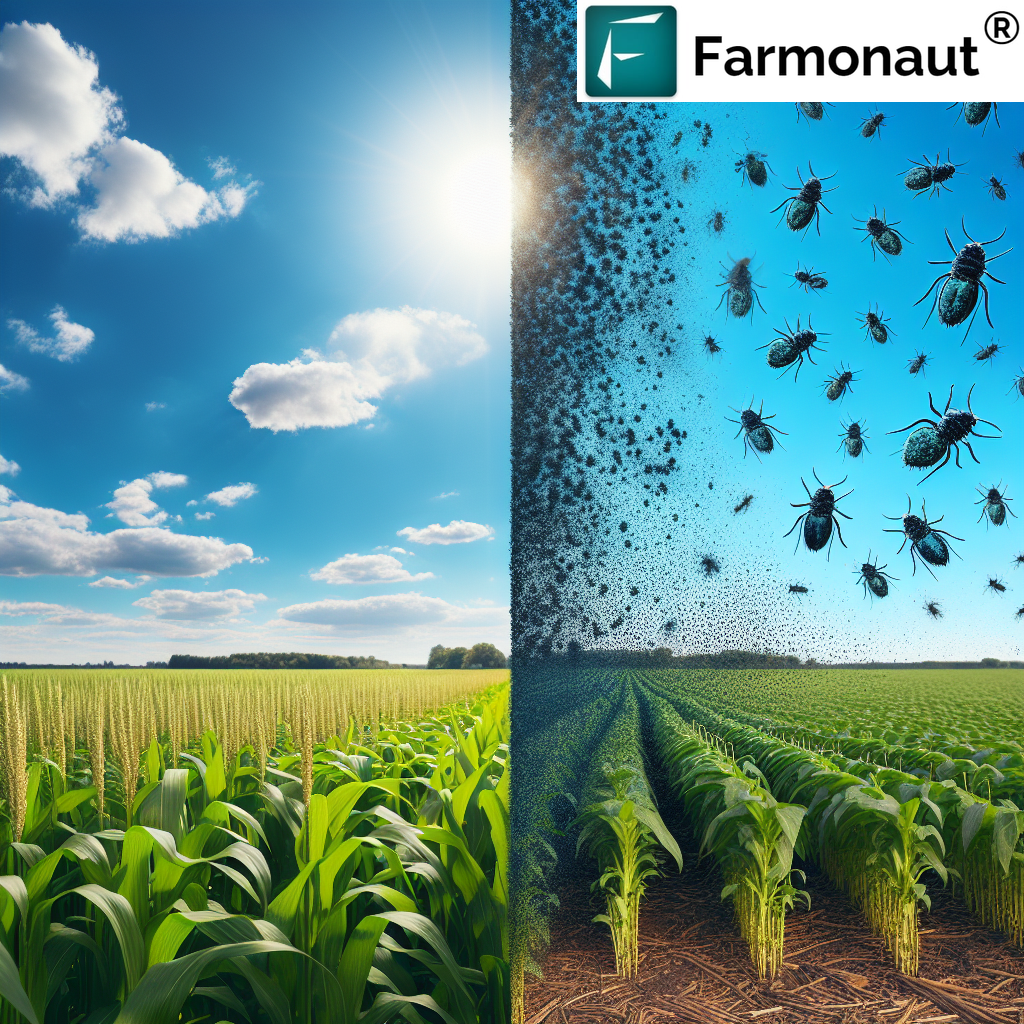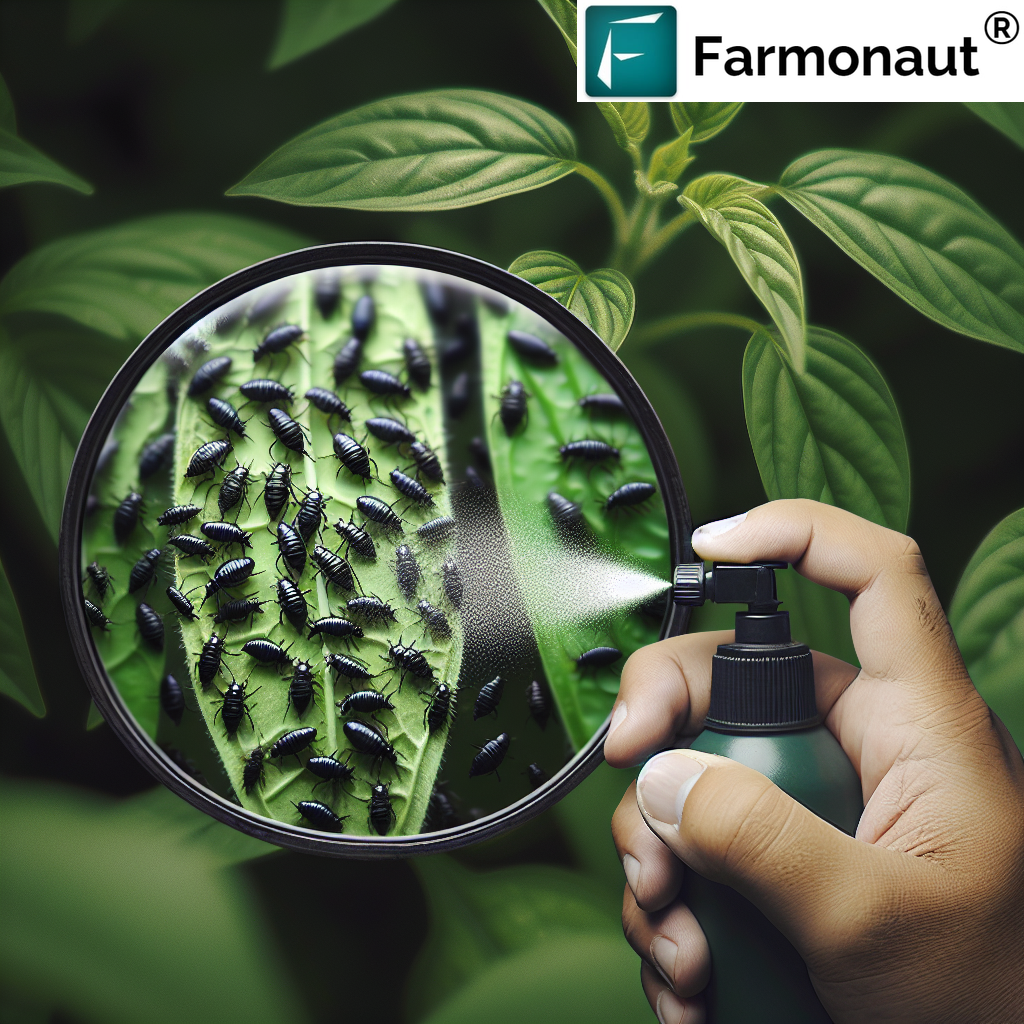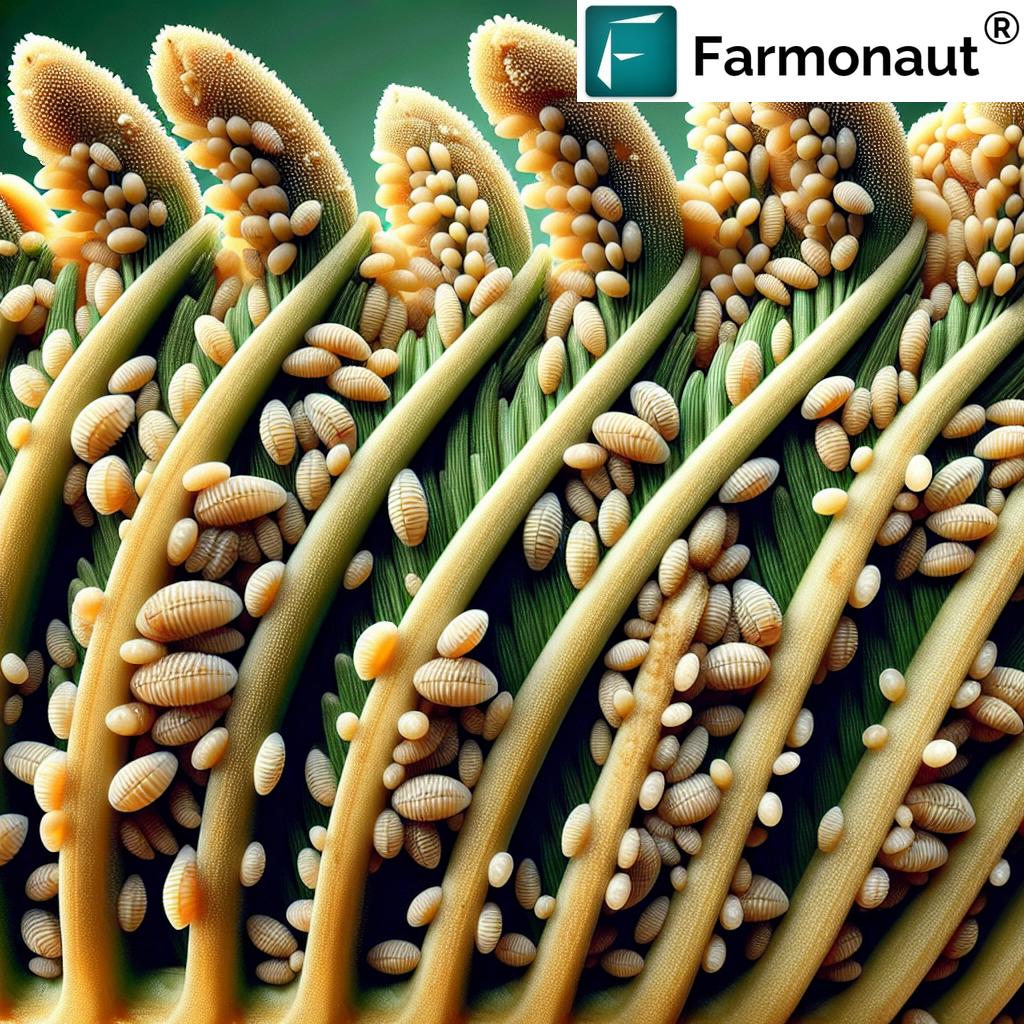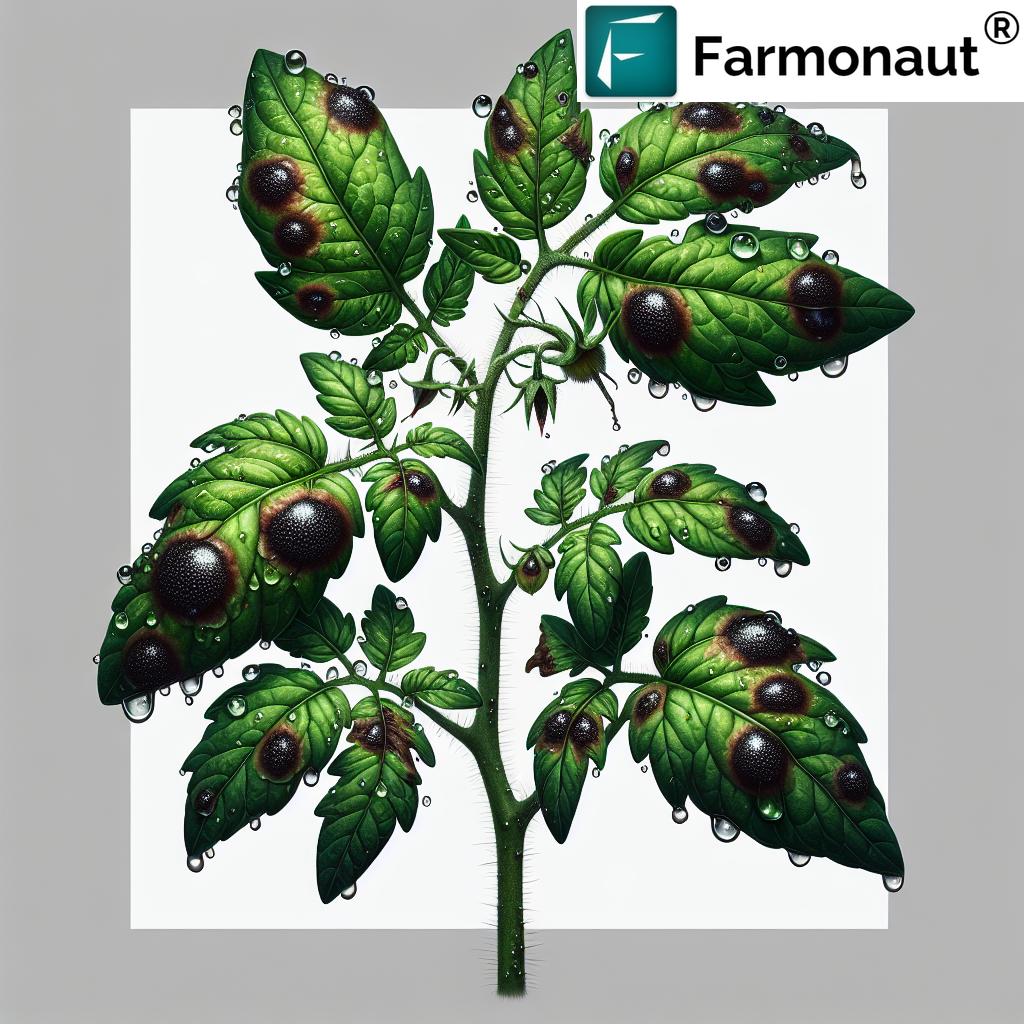Effective Black Aphid Control: Chemical Solutions and Management Strategies for Farmers

As farmers and agricultural experts, we understand the constant challenges that come with protecting crops from pests and diseases. One particularly troublesome pest that many farmers face is the black aphid. These tiny insects can cause significant damage to crops if left unchecked. In this comprehensive guide, we’ll explore effective strategies for black aphids control, with a particular focus on black aphids chemical control methods. We’ll also discuss how modern agricultural technologies, such as those offered by Farmonaut, can enhance pest management efforts.
Understanding Black Aphids
Before delving into control methods, it’s crucial to understand the nature of black aphids and their impact on crops.
- Black aphids are small, soft-bodied insects that feed on plant sap
- They reproduce rapidly, with populations capable of doubling in just a few days
- These pests can cause stunted growth, leaf distortion, and reduced crop yields
- Black aphids are known to transmit plant viruses, further compromising crop health
Integrated Pest Management for Black Aphids Control
At Farmonaut, we advocate for an integrated approach to pest management. This strategy combines various methods to effectively control black aphids while minimizing environmental impact and preserving beneficial insects.
1. Cultural Control Methods
Cultural control methods focus on creating an environment that is less favorable for black aphids:
- Crop rotation to disrupt aphid life cycles
- Proper plant spacing to improve air circulation
- Removal of weeds that may harbor aphids
- Use of reflective mulches to repel aphids
2. Biological Control
Encouraging natural predators can significantly reduce black aphid populations:
- Ladybugs and lacewings are voracious aphid eaters
- Parasitic wasps lay eggs in aphids, controlling their numbers
- Planting flowers that attract beneficial insects
3. Mechanical Control
For small infestations or in greenhouse settings, mechanical control can be effective:
- Physically removing aphids with a strong stream of water
- Using sticky traps to capture flying aphids
- Pruning heavily infested plant parts
4. Chemical Control
When other methods prove insufficient, black aphids chemical control may be necessary. We’ll explore this in more detail in the next section.
Black Aphids Chemical Control: A Comprehensive Guide
Chemical control should be used judiciously as part of an integrated pest management strategy. Here’s what you need to know about effectively using chemicals for black aphid control:
Types of Chemical Controls
- Systemic Insecticides:
- Absorbed by the plant and distributed throughout its tissues
- Effective for long-term control
- Examples: Imidacloprid, Thiamethoxam
- Contact Insecticides:
- Kill aphids on direct contact
- Require thorough coverage of the plant
- Examples: Pyrethrins, Malathion
- Insecticidal Soaps and Oils:
- Low toxicity options suitable for organic farming
- Work by smothering aphids
- Examples: Neem oil, Potassium salts of fatty acids
Application Techniques for Black Aphids Chemical Control
To maximize the effectiveness of chemical controls while minimizing environmental impact, consider the following application techniques:
- Timing: Apply insecticides early in the morning or late in the evening when beneficial insects are less active
- Coverage: Ensure thorough coverage, especially on the undersides of leaves where aphids often hide
- Rotation: Alternate between different chemical classes to prevent resistance development
- Weather conditions: Avoid applying on windy days or when rain is expected
- Follow label instructions: Always adhere to the recommended dosage and safety precautions
Precision Application with Farmonaut Technology
At Farmonaut, we understand the importance of precise and targeted pest control. Our satellite-based crop monitoring system can help farmers identify aphid infestations early and apply chemical controls more effectively:
- Early detection of crop stress caused by aphid infestations
- Targeted application of chemicals to affected areas, reducing overall pesticide use
- Monitoring of treatment effectiveness through regular satellite imagery updates
To learn more about how Farmonaut can enhance your pest management strategies, visit our application page.

Comparison: Farmonaut Satellite System vs. Drone and IoT-based Farm Monitoring
| Feature | Farmonaut Satellite System | Drone-based Monitoring | IoT-based Monitoring |
|---|---|---|---|
| Coverage Area | Large scale (Entire farms) | Limited by flight time and regulations | Limited by sensor placement |
| Frequency of Data Collection | Regular updates (Every 3-5 days) | Dependent on manual flights | Continuous but localized |
| Initial Investment | Low (No hardware required) | High (Drone purchase and training) | Moderate to High (Sensors and network setup) |
| Operational Costs | Low (Subscription-based) | Moderate (Maintenance and operator costs) | Low to Moderate (Maintenance and data plans) |
| Data Analysis | Advanced AI and machine learning | Requires specialized software | Real-time but may lack comprehensive analysis |
| Ease of Use | High (Web and mobile app access) | Moderate (Requires skilled operators) | Moderate (Setup can be complex) |
| Weather Independence | High (Can penetrate cloud cover) | Low (Weather-dependent operations) | Moderate (Some sensors affected by weather) |
Sustainable Approaches to Black Aphids Control
While chemical control is sometimes necessary, we at Farmonaut also emphasize the importance of sustainable pest management practices. Here are some eco-friendly approaches to black aphids control:
1. Companion Planting
Certain plants can repel aphids or attract their natural predators:
- Marigolds: Known to repel aphids
- Nasturtiums: Act as trap crops, drawing aphids away from main crops
- Dill and fennel: Attract beneficial insects that prey on aphids
2. Natural Sprays
Homemade sprays can be effective for small-scale infestations:
- Garlic spray: Blend garlic cloves with water and strain
- Neem oil solution: Mix neem oil with water and a small amount of dish soap
- Chili pepper spray: Blend hot peppers with water and strain
3. Beneficial Insect Habitats
Creating environments that support natural predators can provide long-term aphid control:
- Plant diverse flower species to provide nectar and pollen
- Leave some areas of the farm undisturbed as insect habitats
- Avoid broad-spectrum insecticides that can harm beneficial insects
4. Soil Health Management
Healthy plants are more resistant to aphid infestations:
- Use compost and organic fertilizers to improve soil structure
- Practice crop rotation to maintain soil nutrient balance
- Monitor soil moisture levels to prevent plant stress
Leveraging Technology for Enhanced Black Aphids Control
At Farmonaut, we believe that technology plays a crucial role in modern pest management. Our satellite-based system offers several advantages for farmers dealing with black aphid infestations:
1. Early Detection
Our advanced imaging technology can detect subtle changes in plant health that may indicate the early stages of an aphid infestation. This allows farmers to take action before the problem becomes severe.
2. Precision Targeting
By providing detailed maps of crop health across entire fields, our system enables farmers to target their control efforts precisely where they’re needed most. This can significantly reduce the amount of chemicals used while improving overall effectiveness.
3. Monitoring Treatment Efficacy
After applying control measures, farmers can use our satellite imagery to track the recovery of treated areas. This helps in assessing the effectiveness of different control strategies and making data-driven decisions for future pest management.
4. Integration with Weather Data
Our system incorporates local weather forecasts, helping farmers time their aphid control measures for optimal effectiveness. For instance, avoiding application before expected rainfall or during periods of high wind.
To explore how Farmonaut’s technology can enhance your farm’s pest management strategy, visit our API documentation or download our mobile app for Android or iOS.
Best Practices for Chemical Control of Black Aphids
When resorting to black aphids chemical control, it’s essential to follow best practices to ensure effectiveness and minimize environmental impact:
1. Proper Identification
- Correctly identify the aphid species to choose the most effective control method
- Assess the severity of the infestation to determine if chemical control is necessary
2. Choose the Right Product
- Select insecticides that are specifically effective against aphids
- Consider the crop type and growth stage when choosing a product
- Opt for selective insecticides that spare beneficial insects when possible
3. Timing of Application
- Apply insecticides when aphid populations are still low to prevent exponential growth
- Consider the life cycle of aphids and target vulnerable stages
- Avoid applying during the hottest parts of the day to prevent rapid evaporation of the product
4. Application Technique
- Ensure thorough coverage, especially on the undersides of leaves
- Use appropriate spray equipment and nozzles for optimal distribution
- Calibrate sprayers regularly to ensure accurate application rates
5. Resistance Management
- Rotate between different chemical classes to prevent resistance development
- Avoid repeated use of the same active ingredient within a growing season
- Integrate chemical control with other pest management strategies
6. Environmental Considerations
- Follow all label instructions regarding environmental precautions
- Be aware of nearby water sources and take measures to prevent contamination
- Consider the impact on pollinators and time applications accordingly
7. Record Keeping
- Maintain detailed records of all chemical applications
- Document the effectiveness of treatments for future reference
- Use this data to refine your pest management strategy over time
Integrating Farmonaut’s Technology with Chemical Control Strategies
Our satellite-based system at Farmonaut can significantly enhance the effectiveness of chemical control strategies for black aphids. Here’s how:
1. Precision Application Maps
Farmonaut’s high-resolution satellite imagery allows for the creation of precise application maps. These maps highlight areas of crop stress, potentially indicating aphid infestations. By using these maps, farmers can:
- Target chemical applications to specific areas, reducing overall pesticide use
- Vary application rates based on the severity of infestation in different parts of the field
- Monitor the edges of infested areas to prevent spread
2. Timely Intervention
Regular satellite updates enable early detection of crop stress caused by aphids. This allows farmers to:
- Intervene before aphid populations reach damaging levels
- Reduce the need for widespread chemical applications
- Minimize crop damage and yield loss
3. Efficacy Assessment
After applying chemical controls, Farmonaut’s system can help assess the effectiveness of the treatment:
- Compare pre- and post-treatment imagery to evaluate crop recovery
- Identify areas where treatment may have been insufficient
- Adjust future control strategies based on observed results
4. Integration with Weather Data
Our platform incorporates local weather forecasts, which is crucial for optimal chemical application:
- Plan applications during suitable weather windows
- Avoid spraying before expected rainfall to prevent runoff
- Consider wind conditions to minimize drift
5. Data-Driven Decision Making
By combining satellite imagery with on-ground observations and chemical application data, farmers can make more informed decisions:
- Analyze the cost-effectiveness of different control strategies
- Identify patterns in aphid infestations across seasons
- Refine integrated pest management approaches over time
To learn more about how Farmonaut’s technology can be integrated into your pest management strategy, visit our developer documentation.
Case Studies: Successful Black Aphids Control with Integrated Approaches
While we don’t include specific case studies, it’s worth noting that many farmers have successfully managed black aphid infestations by combining chemical control with other integrated pest management strategies. These success stories often involve:
- Careful monitoring and early intervention
- Targeted use of selective insecticides
- Integration of biological control methods
- Adoption of cultural practices that promote plant health
- Utilization of advanced technologies for precision pest management
Future Trends in Black Aphids Control
As we look to the future, several emerging trends are likely to shape the landscape of black aphid control:
1. Biopesticides
The development of new, environmentally friendly biopesticides is expected to provide more options for organic and sustainable farming practices.
2. Gene Editing
Advances in gene editing technologies may lead to the development of crop varieties with enhanced resistance to aphids.
3. Artificial Intelligence and Machine Learning
These technologies will continue to improve, enhancing our ability to predict and detect pest outbreaks early.
4. Precision Agriculture
The integration of technologies like Farmonaut’s satellite system with smart sprayers and autonomous vehicles will enable ultra-precise pest control measures.
5. Climate Change Adaptation
As climate patterns shift, pest control strategies will need to adapt. Predictive models that account for changing climate conditions will become increasingly important.
Conclusion
Effective black aphids control requires a multifaceted approach that combines cultural, biological, and chemical methods. While black aphids chemical control can be a powerful tool, it should be used judiciously as part of an integrated pest management strategy. By leveraging advanced technologies like Farmonaut’s satellite-based system, farmers can enhance their pest management efforts, reducing chemical use while improving overall crop health and yield.
Remember, successful aphid management is an ongoing process that requires vigilance, adaptability, and a commitment to sustainable farming practices. By staying informed about the latest control methods and technologies, farmers can stay one step ahead of these persistent pests.
FAQs
- Q: How quickly can black aphids reproduce?
A: Black aphids can reproduce rapidly, with populations potentially doubling in as little as 3-4 days under favorable conditions. - Q: Are there any natural predators of black aphids?
A: Yes, several natural predators feed on black aphids, including ladybugs, lacewings, hoverfly larvae, and parasitic wasps. - Q: Can black aphids transmit plant diseases?
A: Yes, black aphids are known vectors for various plant viruses and can transmit diseases as they feed on different plants. - Q: How often should I apply chemical controls for black aphids?
A: The frequency of chemical applications depends on the severity of the infestation and the specific product used. Always follow label instructions and consult with a local agricultural expert. - Q: Are there organic options for black aphid control?
A: Yes, organic options include insecticidal soaps, neem oil, and various homemade sprays. Biological control using natural predators is also an effective organic method. - Q: How can Farmonaut’s technology help in managing black aphid infestations?
A: Farmonaut’s satellite-based system can detect early signs of crop stress caused by aphids, enabling timely intervention. It also allows for precise targeting of control measures and helps monitor the effectiveness of treatments. - Q: Can companion planting help control black aphids?
A: Yes, certain companion plants can repel aphids or attract their natural predators. Examples include marigolds, nasturtiums, and herbs like dill and fennel. - Q: How do I know if my aphid problem is severe enough to warrant chemical control?
A: Consider factors such as the size of the aphid population, the stage of crop growth, and the presence of natural predators. If more than 25% of the plants show signs of infestation and other control methods have been ineffective, chemical control may be necessary. - Q: Are systemic or contact insecticides more effective against black aphids?
A: Both can be effective, but systemic insecticides often provide longer-lasting control as they are absorbed by the plant. The choice depends on factors such as crop type, growth stage, and environmental considerations. - Q: How can I prevent the development of insecticide resistance in black aphid populations?
A: To prevent resistance, rotate between insecticides with different modes of action, avoid overuse of any single product, and integrate chemical control with other pest management strategies.
For more information on how Farmonaut can help you manage pests and improve your farm’s productivity, consider subscribing to our services:












